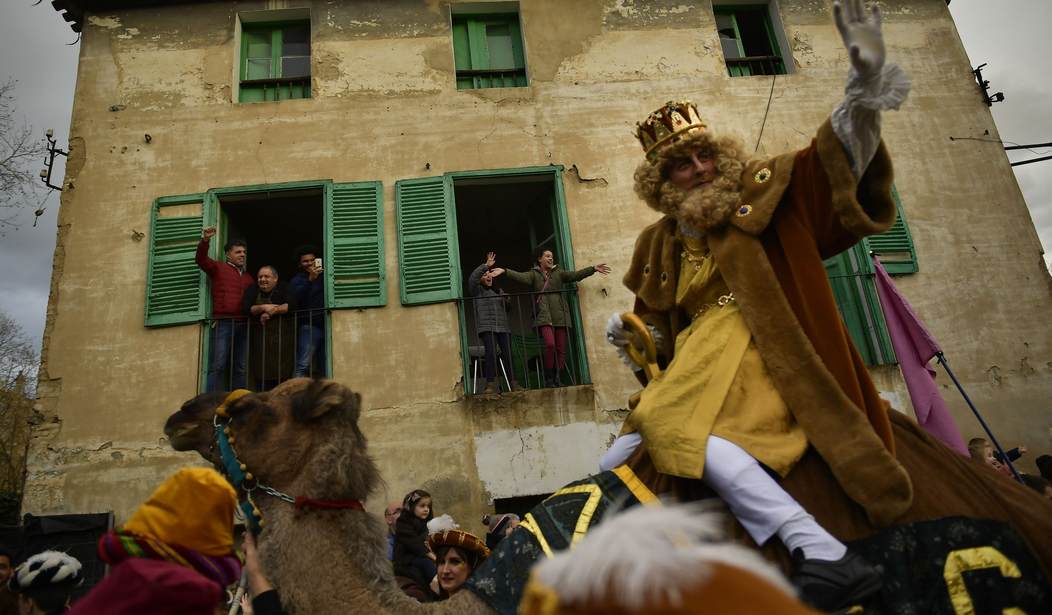Happy Twelfth Night! The Twelve Days of Christmas aren’t just a song; the celebration of Christmas used to last for twelve days after Dec. 25, ending on Jan. 5, which commemorates both the visit of the three Wise Men to Baby Jesus among Western Christians and Jesus’s baptism among Eastern Christians. The celebration of Twelfth Night has been almost entirely forgotten by Protestants, and even few Catholics understand its importance, but there are centuries’ worth of fun and exciting traditions to honor this day. If you’d like a nice break from leftist Jan. 6 hysteria, celebrate Epiphany tonight!
As I learned from the docents at George Washington’s Mt. Vernon, some Americans in the 1700s loved to celebrate Twelfth Night. Inventive delicacies for the holiday feast included marzipan hedgehogs and mincemeat pies. Interestingly, though, in 18th-century America, Twelfth Night was also associated with romance, being a popular day for weddings to take place. George and Martha Washington were among the many colonial couples married on Twelfth Night. Horse races and balls were other common ways colonials celebrated Epiphany.
But there are even older Epiphany traditions from around the world. In Spain, for instance, children would set out their shoes filled with hay or straw the night before Jan. 6. The tradition was that the Magi would come by at night and, in exchange for the hay to feed their camels, would leave the shoes filled with presents, just as they brought presents for the Baby Jesus. Madrid, Spain, still hosts an Epiphany parade, the “Cavalcade of the Kings.” Mexico has kept alive some Spanish Twelfth Night traditions, too.
Related: St. Francis of Assisi and the First Nativity Scene
The UK Country Life says that English revelers had various traditions over the years. Twelfth Night was also called the “Feast of Fools,” and people would light bonfires and go door-to-door playing pranks. Later, masques and pageants became popular, particularly among the aristocrats of Tudor England. Charles Dickens briefly refers to a Twelfth Night party specifically for children in his classic novel A Christmas Carol.
King cakes were popular in many European traditions. The Spanish baked a Roscón de Reyes, or “twisted roll of kings,” often with a porcelain baby and a bean baked into the pastry. Whoever found the baby in his piece would have good luck and be chosen king for the day, whereas the unlucky person who ended up with the bean had to pay for the roll cake.
In England, the bean baked in the king cake had a much more fortunate meaning — whoever found it got to be king for the day. Some king cakes in England reportedly got very elaborate, including sugar figures and other intricate, edible sculptures on top.
The French also had a version of the king cake, called La galette des Rois, originating in northern France in the fourteenth century.
As mentioned above, Byzantine Catholics and Orthodox Christians celebrate Jesus’s baptism today, too. Breitbart described a tradition in Greece: “Greek Orthodox Christians have maintained the tradition throughout the country of tossing a cross into local bodies of water, then having young men dive to find it. The man who pulls the cross out of the water is said to be especially blessed by God for the year.“ Bulgarians wade into the Tundzha River playing bagpipes to perform traditional dances and retrieve the cross, too, Breitbart reported. And Romania celebrates with horse races, the horses decked out and blessed by a priest.
Have a happy Twelfth Night, however you celebrate!










Join the conversation as a VIP Member